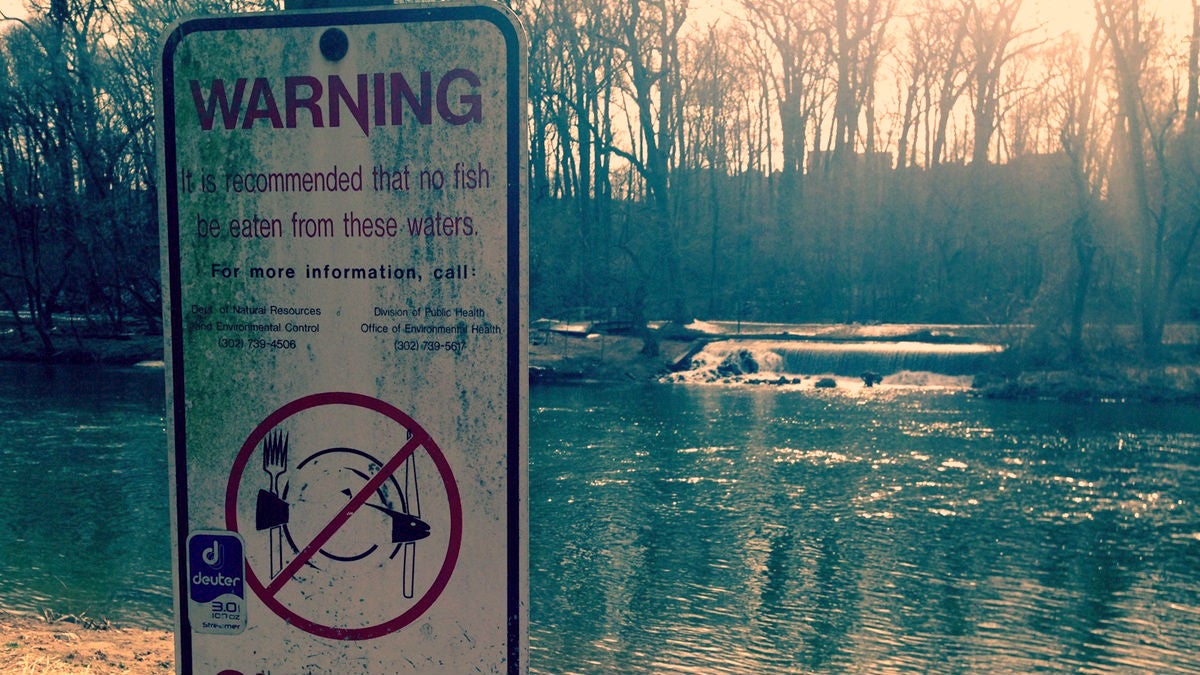Residents challenge Markell on clean water tax initiative

(Mark Eichmann/WHYY)
Some Delawareans who support a clean water plan are concerned that Gov. Jack Markell’s administration might issue new permits to potential polluters.
While Delaware’s streams and rivers make for beautiful vistas, a closer examination reveals disturbing facts about the quality of that water. Currently, residents are advised not to eat fish out of 94 percent of Delaware’s waterways. About 85 percent of the state’s bodes of water are unfit for swimming.
Markell summed up the situation in January’s State of the State Address, stating, “This is embarrassing. This is unacceptable. We must change it.”
In early March, Markell revealed a more detailed plan that would fund water improvements and clean-ups statewide by charging residents a $45 fee.
Some have questioned why, instead of just industrial polluters, everyone must pay.
DNREC Secretary Collin O’Mara responded, “We’re all contributing to the problem. Some of the worst pollution is from industries that are no longer here.”
O’Mara said that the idea was to develop a funding method where everyone pays something, but one in which the amount was proportionate to the contribution.
“It’s very easy to say, ‘They should pay for it,’ or ‘They should pay for it,'” he said. “But the truth is, all of us need to do our part to actually achieve the quality goals that we have.”
Frustrations in Millsboro
The idea of cleaner water in Delaware sounds great to a group of residents in Millsboro. There, along the banks of the Indian River, the group is fighting the planned purchase of a former Vlasic pickle plant by a South Korean-owned chicken processor, Allen Harim Foods.
“It’s not just a chicken processing plant,” said Millsboro resident Dottie Lecates. “It is being proposed for an already-contaminated site. Within a two mile radius we have five major industries here already dumping into the river.”
Lecates and some of her neighbors started purchasing bottled water for drinking and cooking when they discovered cobalt contamination in their private wells last June. She observed that cleaning up Delaware’s water means making better decisions about what is allowed to be dumped in the river.
“The governor came out [earlier] with his plan to clean the water up, taxation, of course,” Lecates said. “I would love to jump on his bandwagon, but I cannot endorse dumping all this wastewater on to the river.”
However, Secretary O’Mara said that the Allen Harim deal is still in the initial phases.
“They actually don’t own the facility yet,” he said. “They haven’t submitted a draft permit or an application for a permit for the facility.”
O’Mara explained that the company will have to meet “the very rigorous standards of pollution control strategy.”
Whether the plant is approved or not, residents who live near the water will continue to monitor the state’s action on water issues, something O’Mara welcomes, especially in light of the new clean-water push.
“Folks should challenge the agency and challenge the administration to make sure we are walking the walk, while at the same time realizing we do need more jobs, we do need more growth,” he said.
More jobs vs. clean water
The balance between growing jobs and maintaining clean water is a worthwhile discussion for Ken Kristl, who leads Widener University’s Environmental Law Clinic.
“We have to balance out how clean do we want our water to be, versus how willing are we to pay to make it clean,” Kristl said. “I think that it raises that question and forces people to confront that issue, and from that perspective if nothing else, by getting people to talk about it, that’s a good thing.”
Kristl, who also represents the Millsboro residents who oppose the chicken plant, said that cleaning the state’s water will require action on all levels of government.
“The hope is that the legislature will join in that commitment, [and that] local governments, county, municipal governments will join in, because that’s what’s going to be necessary to achieve the benefits that the governor envisions,” he said.
Clean water benefits
The benefits envisioned in the clean water plan go beyond the water’s edge for Richie Jones, state director of The Nature Conservancy.
“Healthy waters really can drive an economy,” Jones said. “People want to relocate their businesses here when they know that there’s healthy water for their employees to drink, to recreate around. The societal benefits are huge.”
Jones explained that groups like his are anticipating positive results if this plan is implemented.
“The quality of the water is a factor for sure for wildlife,” he said, “and there really is a close nexus between what’s good for nature or what’s good for species and what’s good for humans.”
The Millsboro residents know the benefits of clean water first-hand. Some, like Lecates, have lived along the Indian River for decades. They want to see a return to a cleaner river that’s been gone for too long.
“We all have to have water. It’s a world-renowned natural resource that we’ve got to take care of, and we’re not doing that,” she said. “As a general public, as legislators, as whatever, we’ve got to start doing that.”
WHYY is your source for fact-based, in-depth journalism and information. As a nonprofit organization, we rely on financial support from readers like you. Please give today.





